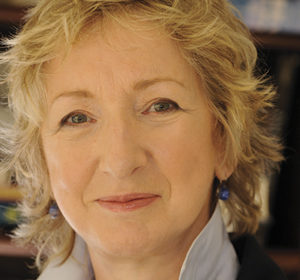“The robins came – that’s a sign of luck,” my cousin whispers in my ear as the men start to shovel the clay.
Sure enough, I look up and see a pair of robins swoop down over the heads of those gathered and then fly off together.
It’s a bright sunny day, but the temperature is below freezing and I worry that the clay will be frozen solid. Perhaps it is. But the men – whom I still think of as young lads – they were boys when they first knew my mother – barely break a sweat as they bend to the job.
They have lines on their faces now and children of their own but I see them as they were – boyhood friends of my brothers always about the place.
“Your mother would be standing over a pot of potatoes on the stove and she would lift the lid and just add some more to the pot when she saw us coming,” is how one of them put it.
My mother passed away on New Year’s Eve in San Francisco where she lived for the past 20 years. In her final days all she talked about was going home to Knigh. So we brought her.
We waked her in the front room, with a fire blazing in the hearth, and the neighbors came, and the cousins from England and Spain, and people I hadn’t seen since I was in primary school, and friends of my young nieces and nephews, and friends of my mother – people who knew her when she worked in Nenagh Hospital.
In Carrig Church, the school choir sang and Fr. Slattery gave a nice sermon and my brother Noel gave a great eulogy that spoke of my mother’s long life – her first journey when she was a month old traveling by ship to India and by train to Quetta, on the border of Afghanistan and what is now Pakistan. (My grandfather was a doctor in the Royal Army Medical Corps. and my mother spent her young life at British colonial outposts). She lived in London during the Blitz, and then Tipperary, and emigrated to San Francisco, a widow in her late sixties, to be near her children and grandchildren.
Now she had made her final journey and come to rest beside my father (d. 1978) in Knigh graveyard.
In truth, in those last days in San Francisco, as I sat beside my mother’s hospital bed, I wondered why she wanted to go back to Ireland. She had enjoyed her life in San Francisco, and had known grand times in cities and foreign parts before meeting my father and settling in Tipperary. Life was hard – especially on women – in Ireland in the 1950s and 60s, even up to the time she left in the 1980s, the economy was still in the doldrums.
But on this day, in this tiny churchyard, just a field away from our family farm where my father’s people have been buried for generations – I know what she found here and why she wanted to come home.
I look around me and I see the spirit of a community that had stood together in tough times and is readying itself for tough times again. I take comfort in the symbolism of robins, and the young men who quietly take up the shovels without being asked. And I think that one day at the end of my traveling, I would like to rest here too.
Tonight we will eat good food, tell great stories and sing songs into the wee hours, and no one will mention the decision by Dell, the largest employer in the area, to cut 1900 jobs which is a huge blow to workers and their families in this community. (Perhaps America’s new President whose great-great-great grandfather came from this locale will look at the long-standing Ireland-America relationship and rethink the present policy on immigration?)
Tonight we will look to the old ways, as we toast the new, and the legacy of our parents and grandparents who made the best of things in the worst of times, and remember, as my mother used to say, “As long as you have your health, you have everything.”
God bless.


Leave a Reply